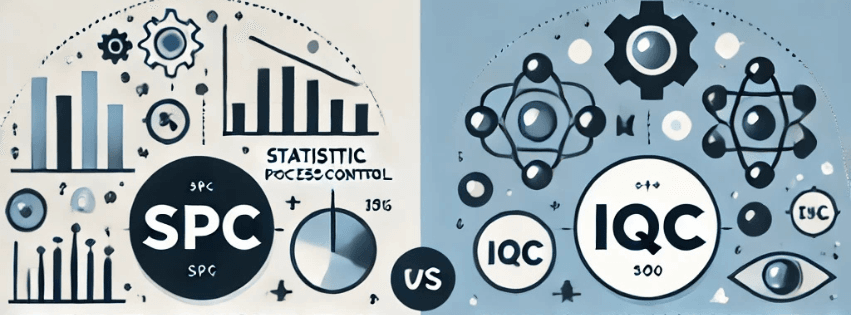When carrying out a production inspection, the question often arises as to the type of inspection. Which module should I use, SPC or IQC (inspection by sampling)?
To answer this question correctly, we need to distinguish between these two types of control.
SPC
The purpose of the SPC is to monitor a process during production. The notion of temporality is important, as parts are produced in a particular order, and the control chart can be used to report on the production thread. In addition, the SPC makes it possible to monitor a process in real time, meaning that any drift in the process will send an alert to the operator so that he can react.
The notion of global sampling is not particularly important in SPC, and we will concentrate solely on it:
- Short-term sampling: At each sampling point, 1, 3 or 5 parts are measured to characterize both the centering and the dispersion of the process at the time of sampling.
- The time between two samplings: Between two samplings, the machine may have drifted, so it's important to maintain a sampling frequency that allows drift to be detected early enough. In SPC, sampling frequency DOES NOT depend on lot size, but only on process drift.
With the SPC, it is quite possible to calculate a defect percentage from the measurement results.
IQC (Inspection by sampling)
The aim of sampling is to determine whether the batch produced meets the quality requirements set. It is therefore carried out POSTERIORI. In IQC, the notion of temporality is not important. The parts have all been produced, so we'll take a sample regardless of the production order.
The notion of global sampling is fundamental in IQC. In fact, control by sampling consists in measuring a given number of samples to validate or reject the batch. The number of samples depends on:
- Batch size
- Type of control, i.e. AQL (Acceptable Quality Level) and severity of control
How to get the best of both worlds
Sometimes, you want to be able to accept or reject a batch that is already in production. We therefore need to guarantee global sampling (to be able to validate the batch) of a batch which is itself in the process of being produced.
In order to do this, the rules of conventional SPC must be applied as long as the batch is in production. Sampling at this stage does not depend on batch size, and enables the detection of any process drift.
Once the batch has been produced, all measurements are transferred to the IQC module. If the number of measurements is sufficient, we can then directly validate production or not. If not, all we need to do is measure the number of missing products, enabling us to carry out sampling checks directly in production.

